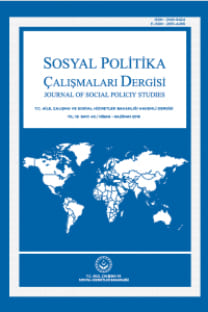Okul Çağı Çocuklarının Beslenme Çantalarının Değerlendirilmesi
Okul çağı çocukları, beslenme çantası, beslenme
Evaluation of the Lunch Boxes of School Children
School age children, lunch box, nutrition,
___
- AUSTIN, S.B., MELLY, S.J,. SANCHEZ, B.N., PATEL, A., BUKA, S.& GORTMAKER, S.L., “Clustering of fast-food restaurants around schools: A novel application of spatial statistics to the study of food environments”, American Jour- nal of Public Health, 2005, sayı: 95, Ss.: 1575- 1581.
- BAKER, J.L., OLSEN, L.W.& SØRENSEN, T.I., New England Journal of Medicine, 2007, sayı: 357, Ss.: 2329-2337.
- CLARK, M.A. & FOX, M.K., “Nutritional Quality of the Diets of US Public School Children and the Role of the School Meal Programs, Journal of Ame- rican Dietetic Association, 2009, sayı: 109(2 Suppl), Ss.: 44-56.
- DAVIS, B., & CARPENTER, C. (2009). Proximity of Fast-Food Restaurants to Schools and Ado- lescent Obesity, American Journal of Public Health, 2009, sayı: 99, Ss.: 505 -510.
- School Food Trust, “Children’s Lunchtime Choices Fol- lowing the Introduction of Food-Based Standards for School Lunch;Observations from Six Primary Schools in Sheffield”, 12.09.2007, at URL: http:// www.schoolfoodtrust.org.uk/UploadDocs/Con- tents/Documents/childrens_lunchtime_choices. pdf
- STANG, J. & BAYERL, C.T., “Position of the American Dietetic association: child and adolescent food and nutrition programs”, Journal of American Dietetic Association, 2003, sayı: 103(7), Ss.: 887-893.
- SUN, S.S., LIANG, R., HUANG, T.T., DANIELS, S.R., ARSLANIAN, S., LIU, K., et al., “Childhood Obe- sity Predicts Adult Metabolic Syndrome: the Fels Longitudinal Study”, Journal of Pediatrics, 2008, sayı: 152, Ss.: 191-200.
- ŞANLIER,, N. VE YABANCI, N., Okul Çağında Bes- lenme, 7-14 Yaş Çocuk Gelişimi Eğitimi, İstan- bul 2005, Morpa Kültür Yayınları.
- UAUY, R., KAIN, J., MERICQ, V., ROJAS, J., & COR- VALÁN, C., Nutrition, Child Growth, and Chronic Disease Prevention, Annals of Medicine, 2008, sayı: 40, Ss.: 11-20.
- VİNCE-WHİTMAN, C., ALDİNGER, C., LEVİNGER, B.& BİRDHİSTLE, I. (2000). Thematic Studies. Scho- ol Health and Nutrition, UNESCO, World Educa- tion Forum, Dekar, Senegal.
- YEHUDA, S., RABINOVITZ, S., & MOSTOFSKY, D.I., Nutritional deficiencies in lerning and cognition. Journal of Padiatric Gastroenterology and Nutri- tion, 2006, sayı: 43, Ss.: 22-25.
- Nutrition, 2007, sayı: 61, Ss.: 856-864.
- ISSN: 2148-9424
- Yayın Aralığı: 4
- Başlangıç: 2012
- Yayıncı: Aile,Çalışma ve Sosyal Hizmetler Bakanlığı
Anne Yaşı ve Gebelik Sayısının Bebeğin Doğum Ağırlığı ile İlişkisi
Yrd. Doç. Dr. Saadet YAZICI, Yrd. Doç. Dr. Gülümser DOLGUN
Gebelerin İnanışları: Besin Seçimi Bebeğin Cinsiyetini ve Fiziksel Özelliklerini Etkiler mi?
Yrd. Doç. Dr. Habibe ŞAHİN, Okt. Dilek ONGAN, Prof. Dr. Neriman İNANÇ, Doç. Dr. Mürüvvet BAŞER, Öğr. Gör. Salime MUCUK
Sosyal Hizmette Kendi Kaderini Tayin Hakkı
Empatik Eğilim Ölçeğinin İlköğretim Sekizinci Sınıflar İçin Uyarlanması
Türkiye'de ve Dünyada Korunmaya İhtiyacı Olan Çocuklara Yönelik Hizmetlerin Tarihsel Gelişimi
Okul Çağı Çocuklarının Beslenme Çantalarının Değerlendirilmesi
Prof. Dr. Işıl ŞİMŞEK, Yrd. Doç. Dr. Nurcan YABANCI, Şemsi TURAN
